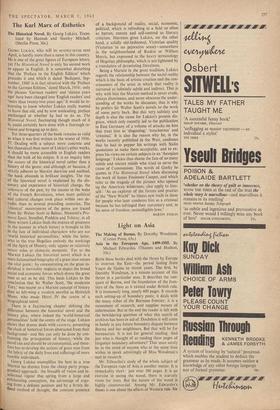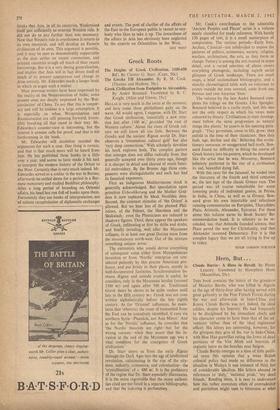Light on Asia
BOTH these books deal with the thrust by Europe to overrun the East—the period lasting from Vasco da Gama to recent years. The first, by Dorothy Woodman, is a minute account of this thrust in a particular area. It describes the con- quest of Burma, and the foundation of the fron- tiers of the State as it existed under British rule. It is immensely long, nearly 600 pages. It records each setting-up of boundary posts; it deals with the many tribes of the Burmese frontier; it is a monument of research, and supplies masses of information. But at the end the reader is left with the bewildering question of what this search of archives has been in aid of. Doubtless it will come in handy in any future boundary dispute between Burma and her neighbours. But that will be for bureaucrats. it is not for general reading. And just who is thought of as reading these pages of forgotten boundary adventure? That must surely be in the mind of anyone who at the same time wishes to speak admiringly of Miss Woodman's zeal in research.
Mr. Edwardes's study of the whole subject of the European rape of Asia is another matter. It is remarkably short : just over 300 pages. It is an exercise in seeing the wood; there is scarcely room for trees. But the nature of the wood is highly controversial. Among Mr. Edwardes's theses is one about the effects of Western rule. He
thinks that Asia, in all its countries, Westernised itself just sufficiently to overrun Western rule. It did not do so any further than was necessary. Now that Western rule is overthrown it reverts to its own resources, and will develop an Eastern civilisation of its own. This argument is possible, and it. may be seen as demonstrably supportable as the dust settles on recent commotion, and oriental countries slough off much of their recent borrowings. But it is a very daring generalisation, and implies that Asia will in fact divest itself of much of its present appearance and change its dress entirely. Mr. Edwardes needs a longer book in which to'argue such a matter.
Most previous writers have been impressed by the reality of the Westernisation of India; some present ones are deeply impressed by the `Rus- sianisation' of China. To say that this is tempor- ary and will be Undone is a large assumption. It is especially so when Westernisation and Russianisation are still pressing forward, irresis- tibly breaking all that stand in their way. Mr. Edwardes's counter-view is interesting, but the interest it arouses calls for proof, and that is not forthcoming in the book.
Mr. Edwardes will doubtless marshal the arguments for such a case. One thing is certain, and that is that much more will be heard from him. He has published three books in a little over a year, and seems to have made it his task to interpret the modern history of the Orient to the West. Certainly that is very much indeed. Mr. Edwardes served as a soldier in the war in Burma; afterwards he settled down for a period in a Bur- mese monastery and studied Buddhist philosophy. After a long period of brooding on Oriental affairs, his head has run full of books upon them. Fortunately they are books of interpretation, not /of minute recapitulation of diplomatic exchanges
and events. The post of clarifier of the affairs of the East to the European public is vacant to any- body who likes to take it up. The inwardness of the affairs in Asia has obviously been neglected by the experts on Orientalism in the West.
GUY WINT



































 Previous page
Previous page